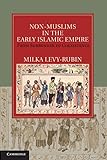Non-Muslims in the early Islamic Empire : from surrender to coexistence /
By: Levy-Rubin, Milka
Material type: BookSeries: Publisher: New York : Cambridge University Press, 2011.Description: xv, 267 p. : ill. ; 24 cm.ISBN: 9781107004337 (hardback); 1107004330 (hardback)Subject(s): Dhimmis (Islamic law) -- Islamic Empire -- History | Religious minorities -- Legal status, laws, etc -- Islamic Empire -- History | Islamic Empire -- Ethnic relations | Minorities (Islamic law) | Islam and state -- Islamic Empire -- History | Islam and politics -- Islamic Empire -- History | Religious tolerance -- Islamic Empire -- History | Islamic Empire -- Politics and governmentDDC classification: 305.60956/09021
BookSeries: Publisher: New York : Cambridge University Press, 2011.Description: xv, 267 p. : ill. ; 24 cm.ISBN: 9781107004337 (hardback); 1107004330 (hardback)Subject(s): Dhimmis (Islamic law) -- Islamic Empire -- History | Religious minorities -- Legal status, laws, etc -- Islamic Empire -- History | Islamic Empire -- Ethnic relations | Minorities (Islamic law) | Islam and state -- Islamic Empire -- History | Islam and politics -- Islamic Empire -- History | Religious tolerance -- Islamic Empire -- History | Islamic Empire -- Politics and governmentDDC classification: 305.60956/09021 | Item type | Home library | Call number | Status | Date due | Barcode | Item holds |
|---|---|---|---|---|---|---|
| REGULAR | University of Wollongong in Dubai Islamic Collection | 305.6095609021 LE NO (Browse shelf) | Available | T0045076 |
, Shelving location: Islamic Collection Close shelf browser

|

|

|

|

|

|
No cover image available | ||
| 305.486971 AH WO Women and gender in Islam : historical roots of a modern debate / | 305.486971 AH WO Women and gender in Islam : historical roots of a modern debate / | 305.486971 VA LU Values and perceptions of the Islamic and Middle Eastern publics / | 305.6095609021 LE NO Non-Muslims in the early Islamic Empire : from surrender to coexistence / | 305.697 LE IS The Islamophobia industry : how the right manufactures fear of Muslims / | 305.697 ZE IS Islamophobia, victimisation and the veil / | 305.697041 SA IS Islamophobia and securitization : |
"The Muslim conquest of the East in the seventh century entailed the subjugation of Christians, Jews, Zoroastrians, and others. Although much has been written about the status of non-Muslims in the Islamic empire, no previous works have examined how the rules applying to minorities were formulated. Milka Levy-Rubin's remarkable book traces the emergence of these regulations from the first surrender agreements in the immediate aftermath of conquest to the formation of the canonic document called the Pact of Ụmar, which was formalized under the early Ạbbasids, in the first half of the ninth century. What the study reveals is that the conquered peoples themselves played a major role in the creation of these policies, and that these were based on long-standing traditions, customs, and institutions from earlier pre-Islamic cultures that originated in the worlds of both the conquerors and the conquered. In its connections to Roman, Byzantine, and Sasanian traditions, the book will appeal to historians of Europe as well as Arabia and Persia"--Provided by publisher.
Includes bibliographical references and index.
